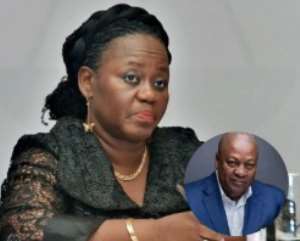
Accra, Ghana — In a historic moment for Ghana’s judiciary, Chief Justice Gertrude Araba Esaaba Torkornoo has been suspended from office after the Council of State established a prima facie case against her. President John Dramani Mahama, in strict accordance with the 1992 Constitution, has appointed a five-member committee to probe the petitions filed against the Chief Justice.
President Mahama Has Not Breached the Constitution
Legal experts and civil society organisations have unanimously affirmed that President Mahama has not faulted any provision of the Constitution. Every step taken has been anchored in due process, demonstrating fidelity to Ghana’s democratic framework. His conduct is widely described as a model of constitutional leadership.
From referring the petition to the Council of State, to suspending the Chief Justice based on prima facie findings, and constituting the investigative committee, President Mahama remains firmly on the legal path laid out in the Constitution.
Constitutional Basis for Appointment and Suspension
🔹 Appointment – Article 144(1)
“The Chief Justice shall be appointed by the President acting in consultation with the Council of State and with the approval of Parliament.”
The Chief Justice is therefore:
Nominated by the President Vetted by the Appointments Committee of Parliament Approved by the full House Sworn in by the President
🔹 Suspension and Investigation – Article 146
Article 146(3): The President refers the petition to the Council of State. Article 146(6): A committee is set up once a prima facie case is established. Article 146(10): The President may suspend the Chief Justice while the investigation proceeds.
All actions taken by the President thus far are in full conformity with these constitutional clauses.
Chief Justice’s Reaction and Public Interpretation
At a press briefing, Chief Justice Torkornoo described the process as “unfair” and opaque. Her concerns appear rooted in the nature of her appointment — a highly public, transparent vetting by Parliament, followed by presidential swearing-in. She may have anticipated a similar standard of openness in the process concerning her possible removal.
However, legal scholars explain that appointment (Art. 144) and removal (Art. 146) are guided by different procedures, each with its own purpose and checks.
Contributions from Legal Experts on Chief Justice Torkornoo’s Actions and Inactions
Several prominent legal experts have weighed in on the situation, offering balanced views on the Chief Justice’s tenure:
Some experts acknowledge Chief Justice Torkornoo’s efforts in judicial reforms but raise concerns over delays in case management and slow implementation of some reforms affecting access to justice. Others criticize her leadership for perceived lack of transparency in judiciary administration, which some say has eroded public trust. The investigation aims to clarify whether her actions or omissions amount to grounds for removal under the Constitution.
Criticism of the Chief Justice’s Press Conference
A growing number of legal experts and public commentators have condemned Chief Justice Torkornoo’s recent press conference:
Professor Kwesi Aboagye called the press briefing “unfortunate and inappropriate,” stressing the importance of respecting confidential constitutional processes. Dr. Ama Asantewaa noted that condemning the process publicly could damage public confidence in judicial independence. Mr. Joseph Mensah warned that airing grievances before the committee convenes undermines procedural norms. Ms. Lydia Koomson described the press conference as defensive, potentially harming public trust. Dr. Emmanuel Badu cautioned against attempts to influence public opinion while under investigation. Mr. Nana Ofori emphasized the need for judicial officers to avoid politicizing the process. Media analysts added that her remarks might confuse citizens and create unnecessary tension.
These critiques emphasize that due process should take precedence over public commentary.
Citizens’ Concerns and Public Comments
The suspension of Chief Justice Torkornoo has sparked diverse public opinions:
Some see it as a necessary step to uphold the rule of law. Others worry about possible political interference. Many call for transparency and fairness in the proceedings. Civil society, including COFIIG-GHANA, urges calm and trust in the constitutional process. Some citizens empathize with the Chief Justice, hoping her legacy is preserved if exonerated.
Civil Society Groups Praise Due Process
COFIIG-GHANA praised the President’s constitutional discipline. Ghana Integrity Initiative (GII), CDD-Ghana, and IMANI Africa called for impartiality and transparency.
A Word to the Suspended Chief Justice and All Office Holders
This is the time to be brave. Face the committee with the same confidence and integrity you once used to lead the judiciary. Let not your current frustration lead to muddying the very clean waters from which you once drank.
Now, as the second Chief Justice to undergo such a process, your situation serves as a reminder: all public officers must be ready for accountability. Let truth and justice take their course.
Final Reflections
At this juncture, I rest my case. I am not a legal practitioner, but a concerned citizen who has compiled these constitutional facts to help educate the public. I welcome correction where needed.
Conclusion: Ghana’s Constitution at Work
This is democracy at work — law above personality. The President has acted constitutionally. The Chief Justice has a right to be heard. And the people of Ghana are watching.
May justice prevail over sentiment, and may the Constitution guide us all.
Author
Thank you.
Written by:
Hon. Simon Yaw Awadzi
Executive Director,
Coalition for Integrity in Governance – Ghana (COFIIG-GHANA)
Contact: [email protected]


